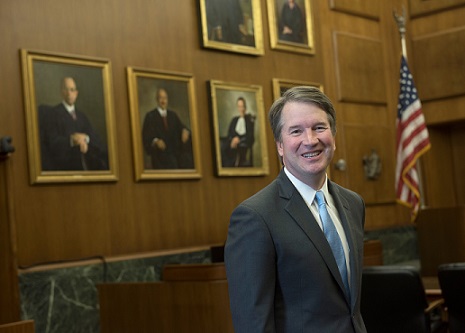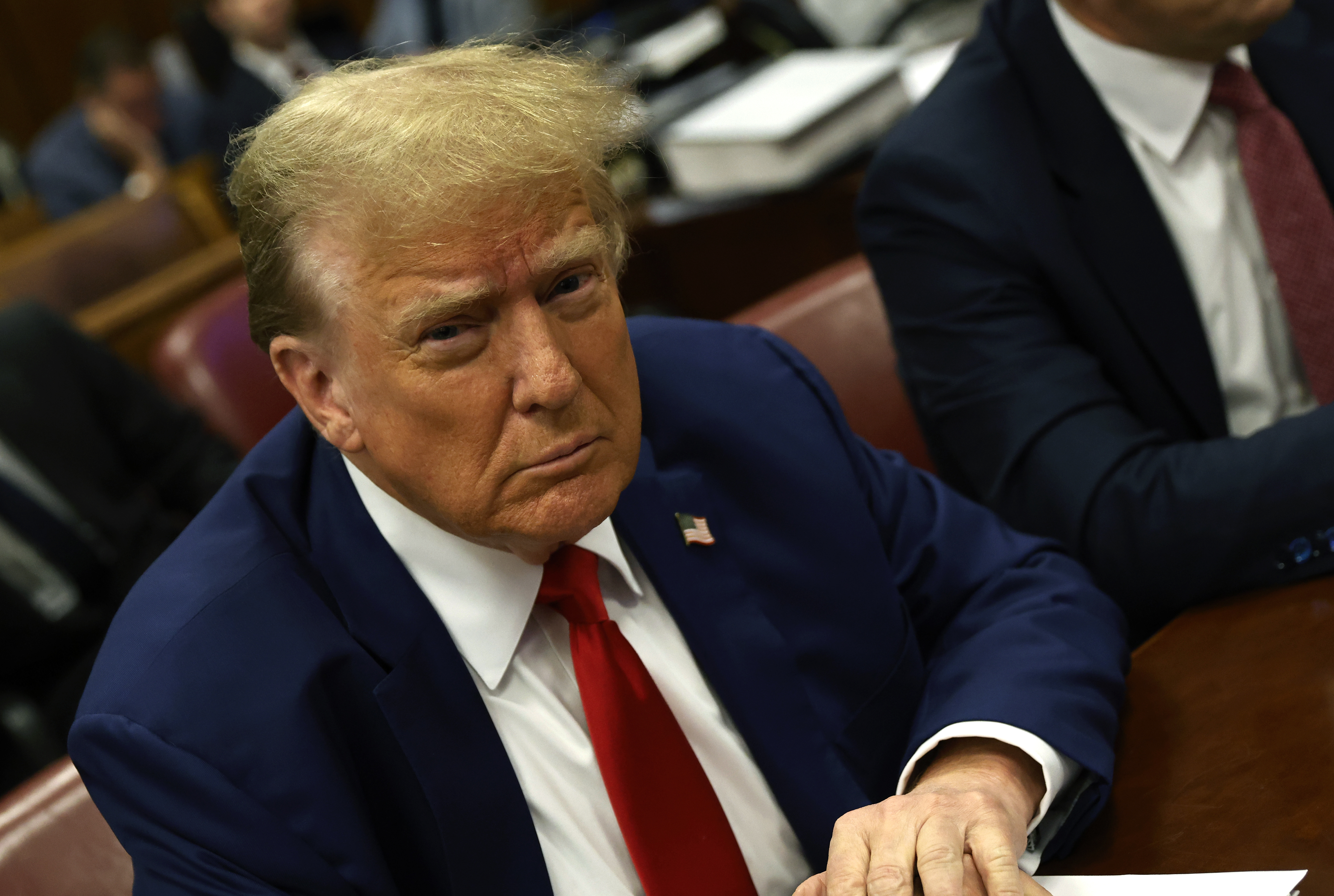Meet Brett Kavanaugh, Trump's nominee for the Supreme Court

Judge Brett Kavanaugh. Photo by U.S. Court of Appeals for the District of Columbia Circuit.
Judge Brett Kavanaugh explained his judicial philosophy when he accepted President Donald Trump’s nomination Monday evening to replace Justice Anthony M. Kennedy to the U.S. Supreme Court.
“My judicial philosophy is straightforward,” said Kavanaugh, 53, a judge on the U.S. Court of Appeals for the D.C. Circuit. “A judge must be independent and must interpret the law, not make the law. A judge must interpret statutes as written. And a judge must interpret the Constitution as written, informed by history and tradition and precedent.”
Kavanaugh added that he believes an independent judiciary “is the crown jewel of our constitutional republic” and he believes the Constitution’s separation of powers protects individual liberty. “If confirmed by the Senate,” he said, “I will keep an open mind in every case, and I will always strive to preserve the Constitution of the United States and the American rule of law.”
In a New York Times op-ed, Yale law professor Akhil Reed Amar said he had supported Hillary Clinton for president and failed Supreme Court nominee Merrick Garland, but Kavanaugh, an originalist, is “a superb nominee” who is widely respected. Kavanaugh is second only to Garland for the number of law clerks that have gone on to Supreme Court clerkships, he is an “avid consumer of legal scholarship,” and he admits and learns from his mistakes, Amar said.
See also: ABA committee to evaluate Trump’s Supreme Court pick Kavanaugh
“Good appellate judges faithfully follow the Supreme Court; great ones influence and help steer it,” Amar wrote. “Several of Judge Kavanaugh’s most important ideas and arguments—such as his powerful defense of presidential authority to oversee federal bureaucrats and his skepticism about newfangled attacks on the property rights of criminal defendants—have found their way into Supreme Court opinions.”
University of Texas law professor Stephen Vladeck told the Washington Post that Kavanaugh is “an unrelenting, unapologetic defender of presidential power” who believes courts should rein in “large swaths of the current administrative state.” The Wall Street Journal says his opinions “have been marked with dozens of votes to roll back rules and regulations,” including in dissents opposing net neutrality rules and greenhouse-gas restrictions.
NOTABLE OPINIONS
The National Law Journal, the Wall Street Journal and the Associated Press list notable opinions by Kavanaugh. One or them is PHH Corp. v. CFPB, in which Kavanaugh wrote a dissent contending that massive power given to the director of the Consumer Financial Protection Bureau was unconstitutional. Rather than strike down the entire CFPB, Kavanaugh said, the court should strike down the provision requiring cause for removal of the agency’s director.
In Garza v. Hargan, Kavanaugh dissented from a decision allowing an immigrant teen being held in a government shelter to have an abortion. Kavanaugh argued that the majority decision “reflects a philosophy that unlawful immigrant minors have a right to immediate abortion on demand, not to be interfered with even by government efforts to help minors navigate what is undeniably a difficult situation by expeditiously transferring them to their sponsors.” He said the government had a “permissible interest in favoring fetal life, protecting the best interests of a minor, and refraining from facilitating abortion.” He did not join a dissent, however, that said immigrants do not have a constitutional right to an elective abortion, Politico has reported.
In Seven Sky v. Holder, Kavanaugh argued the court had no jurisdiction to hear a challenge to the Affordable Care Act because it was a tax matter governed by a federal law that limits jurisdiction in such cases.
In Heller v. District of Columbia, Kavanaugh argued in a dissent that the Second Amendment protects the right to own semi-automatic rifles.
BACKGROUND AND EARLY CAREER
Kavanaugh stressed his Catholic roots and his links to justices on the Supreme Court during his speech Monday. He clerked for Justice Anthony M. Kennedy and teaches at Harvard Law School, thanks to his hiring by Justice Elena Kagan, who was dean of the law school when he was hired 11 years ago. He also taught courses at Yale Law School and Georgetown University Law Center, according to his official biography.
Kavanaugh said he was an altar boy as a youth, and today he serves meals to the homeless for Catholic Charities. He has coached the basketball teams of his two daughters and also tutors children at local elementary schools.
Kavanaugh called his mother, Martha, a “trailblazer.” She was a schoolteacher who went to law school when Kavanaugh was 10 years old, becoming a prosecutor and a trial judge in Montgomery County, Maryland, according to the Washington Post. His father, Edward, went to law school at night while working full time when Kavanaugh was a teen.
Kavanaugh met his wife, Ashley, when they were both working in the George W. Bush White House. Kavanaugh had served as assistant to the president and staff secretary to the president, while Ashley was Bush’s personal secretary. Their first date was the night before the terrorist attacks. Today Kavanaugh’s wife is town manager of Chevy Chase Village, Maryland.
Kavanaugh was appointed to the U.S. Court of Appeals for the D.C. Circuit in May 2006 after his nomination by Bush. He is a graduate of Yale’s college and law school, and, before his Supreme Court clerkship, he clerked for Judge Alex Kozinski of the San Francisco-based 9th U.S. Circuit Court of Appeals and for Judge Walter Stapleton of the Philadelphia-based 3rd U.S. Circuit Court of Appeals.
He was also a partner in Kirkland & Ellis and worked for independent counsel Ken Starr. His only Supreme Court argument was in Swidler & Berlin v. United States, and he lost. The Supreme Court ruled that attorney-client privilege protected the notes of the lawyer for deputy White House counsel Vincent Foster before Foster committed suicide, the Washington Post reported at the time. The ruling frustrated Starr’s bid to get more information about whether Hillary Clinton lied about her role in the firing of White House travel office employees.
Kavanaugh helped write Starr’s report arguing that President Bill Clinton could be impeached for lying to his staff and misleading the public, according to the New York Times. But in a 2009 article in the University of Minnesota Law Review, he argued that Congress should pass laws to protect presidents from criminal and civil cases until they have left office. Impeachment rather than indictment is the best way to deal with a president who “does something dastardly,” he wrote in the article.
UPCOMING CONFIRMATION HEARING
Kavanaugh is likely to be confirmed, though Senate Democrats are expected to ask pointed questions in confirmation hearings. Directly after Kennedy’s retirement, several Democrats said publicly that Trump’s pick to replace him should not be given a hearing until after the midterm elections. Many used language echoing that used by Republican Sen, Mitch McConnell of Kentucky to justify refusing to hold hearings on Garland, the Supreme Court nominee of former President Barack Obama.
However, political observers believe Democrats don’t have the votes to use McConnell’s tactics against Trump’s nominee. As Politico observed July 6, certain Democrats who come from conservative states are up for re-election and may end up voting with Republicans. The conservative Judicial Crisis Network has promised to run local ads pressuring those senators, the Washington Post reported July 4. The group will be spending $1.4 million to buy cable and digital ads in Alabama, Indiana, North Dakota and West Virginia, states where Democratic votes are believed to be in play. It has also launched a website, ConfirmKavanaugh.com.
Democrats would also need at least one Republican vote, as the Post noted. Political strategists are focused on Republican Senators Susan Collins of Maine and Lisa Murkowski of Alaska, both of whom have occasionally defied their party on health care and reproductive rights issues. Politically liberal groups are also organizing campaigns to win those senators over.
Lorelei Laird contributed to this article.
Write a letter to the editor, share a story tip or update, or report an error.


